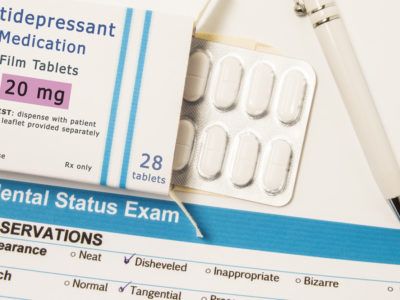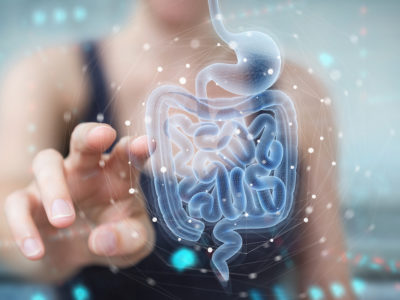Table of Contents[Hide][Show]
Is There Really a Connection Between the Gut and the Brain?
Here’s a scenario:
Let’s say you just got the phone call that you’ve been waiting your whole career for. You’ve got the promotion. You made the sale. You landed the gig.
Whatever it is, it’s the best day you’ve ever had at work.
How does that feel in your body—more specifically, your gut? Take note.
Now, you’ve just left the office. You follow the traffic light out of your parking lot, turning onto the frontage road to a freeway.
Someone decides to start changing lanes right as you join. Luckily, you both notice just in time to avoid a hit.
How does that feel in your body and your gut?
You might not think about it this way, but there’s a reason emotionally positive and highly stressful responses happen as much in your head as they do in your gut.
So, what is going on to cause all this?
The Gut-Brain Axis – From Science Fiction to Reality
Introducing…the gut-brain axis! Also known as: the reason your mental health, brain function, and digestion often go hand-in-hand.
The phrase “gut-brain axis” (GBA) refers to the bidirectional communication and connection between the central nervous system (the brain) and the enteric nervous system (the organs in the gastrointestinal tract).
Gut microbes communicate to the CNS through neuronal, endocrine, metabolic, and immune signaling channels. with the vagus nerve serving as the main communication pathway.
Stress in the mind can affect the health of your gut bacteria and digestion, and in turn, a disruption in your gut or intestinal microbiota composition can cause or contribute to mental stress, anxiety, and even mood disorders and other cognitive impairments and health issues.
The tie between these two parts of our nervous system is a fairly new study in neuroscience, although it’s been a suspected link for some time.
After all, how long has the phrase “a gut feeling” been around?
Just like we highlighted in the example scenario at the beginning of this article, the perceived stress in our lives has a direct impact on how our gut feels.
And now, we know that it also affects how well your gut works, too.
How Mental Health Affects Your Digestion
External stressors can impact the way you perceive things, but this perceived stress can cause a very real manifestation in your physical body.
Most notably, if the brain is perceiving high levels of stress, the central nervous system (CNS) signaling to the gut can be thrown off.
This is very apparent in people who have experienced intense trauma, especially as children.
Not only does mental stress impact the signaling of the brain to the gut microbiome, it can also cause:
- Less bacterial diversity (fewer different types of beneficial microorganisms in the gut)
- Higher proportions of bad bacteria in the gut (pathogens that lead to dysbiosis, intestinal permeability and many gastrointestinal disorders such as irritable bowel syndrome (IBS))
- Smaller populations of important keystone bacteria, such as actinobacteria, that are crucial for healthy microbiome balance and homeostasis
These 3 changes in the microflora makeup can cause decreased immune response as well as long-term digestive upset.
Long-term issues with digestion can lead to:
- Malnutrition due to a dysfunction in nutrient absorptionImproper blood sugar regulation
- Misaligned hunger signalling (causing under- or over-eating)
- Insulin resistance
- Weight gain
In other words, mental stress can affect many functions in the physical body, and much of it has to do with how the CNS affects the gut and gut bacteria.
How Does the Gut Microbiota Help with Mental Health?
We used to think that most of our hormones and neurotransmitters were made in the brain.
Now, it’s been proven that several of them are mostly created in the large intestine, which has come to be called “the second brain.”
This includes the extremely important neurotransmitters:
- Serotonin (up to 95% of your supply is made in the gut)
- Dopamine (about 50% of your supply is made in the gut)
- GABA (made in the pancreas)
- Norepinephrine
And for most of them, it’s not our actual organs producing those neurotransmitters for us.
It’s the gut microbiota that lives in our digestive tract.
Let’s dive into each of these neurotransmitters a bit more to see how they each play important roles in our mental (and therefore, overall) health.
Serotonin
Serotonin is known as the “mood balancing” hormone.
It’s the key player in lowering anxiety and boosting happiness, but affects many other parts of the body as well.
Serotonin helps to regulate the digestive process, triggers blood clotting to heal wounds, and works to maintain bone strength.
It’s also important for quality sleep because any excess serotonin that our gut produces is converted into melatonin, the body’s “fall asleep” hormone.
The “serotonin hypothesis” has been the long-proposed link between serotonin levels and depression. This proposes that serotonin (or lack thereof) is why depression occurs.
Although this hypothesis has been disproven as the main cause of depression, it’s largely acknowledged that long-term increase in serotonin will affect your daily emotions, which can then reprogram the brain to have a lasting, balanced mood.
This “long-term mood boost” then results in fewer depressive symptoms over time, effectively reprogramming the brain to experience fewer symptoms of depression.
Related
What You Need to Know About SSRIs and Your Gut Health
In 2017, one study reported that one in six Americans takes an SSRI every day. That was nearly two years ago – would you surmise that that number has gone up or down? Even if that number stayed exactly the same, that’s a heavy load of the population taking selective serotonin reuptake inhibitors. Since the …
Dopamine
Dopamine is your neurotransmitter that is associated with cognition and focus, mental drive, reward, motor control, and reproductive functions.
About half of your body’s dopamine is produced in the gut—specifically, from intestinal epithelial cells and seems to be modulated by certain gut bacteria.
Decreased levels of dopamine can cause:
- Muscle cramps
- Stiff muscles
- Poor digestion
- Inability to focus
- Low self-esteem
- Anxiety
- Lack of self-awareness
- Mood swings
And long-term low dopamine can lead to chronic conditions such as depression and Parkinson’s Disease.
GABA
GABA is exclusively made by beta cells in your pancreas.
This neurotransmitter is the major inhibitory hormone in both the brain and the spine.
GABA is known to help reduce anxiety and stress, allow for relaxation, and stimulate beta-cell growth in the pancreas (which allows for sufficient insulin production).
Too little GABA in your body can result in chronic anxiety and stress, depression, difficulty concentrating, insomnia, body aches and headaches, and possibly higher risk of substance abuse.
Norepinephrine
Norepinephrine is one of the body’s stress response hormones, produced by the adrenal glands, often associated with adrenaline.
This is released by the sympathetic nervous system (a branch of the autonomic nervous system) under stressful conditions, especially those that cause a fight-or-flight response. Norepinephrine’s specific job is to increase heart rate and blood pressure in response to a perceived threat.
When the CNS releases a high dose of norepinephrine because you’re stressed, some of that norepinephrine makes its way into the gut and can cause radical bacterial composition change and increased risk of pathogenesis (disease development) in a short period of time.
If this bacterial change is maintained long-term, the body’s immune system can be weakened and chronic health problems such as cancer, autoimmune conditions, skin challenges and more can occur.
Recommended Ways to Improve the Gut-brain Connection
It’s a proven fact that gut health is crucial to your overall health… And now we also have evidence of your gut’s far-ranging impact on your neurological health.
Naturally, that begs the question: How can you grow and fuel your gut microbes in a way that’s beneficial to your emotional and total body health?
There are two main components of a diet that are good for your gut health, and therefore good for your neurotransmitters: probiotics and prebiotics. Let’s look at each in more detail.
Probiotics
Probiotics are discussed far more in the “mainstream” conversations regarding gut health, so let’s start there.
You can look at probiotics like you’re refilling the tank of “good bacteria.” Probiotic products are foods or supplements that contain bacteria known to be beneficial for your gut health.
Examples of great probiotic foods include:
- Sauerkraut
- Kimchi
- Kombucha
- Certain yogurts
- Kefir
- Certain pickle brands (or homemade/fermented)
RELATED: For more on our recommended probiotic supplement, use this link.
Prebiotics
Prebiotics, on the other hand, are the foods that fuel your good gut bacteria, and promote their strength and growth.
This means you must consume prebiotics yourself to “feed” your good bacteria, which allows them to thrive and continue producing the proper amount of neurotransmitters we need for our mental health.
In addition to feeding our gut bacteria, the fermentation of prebiotics by gut microbiota produces short-chain fatty acids. SCFAs—the three main ones being acetate, propionate, and butyrate—improve gut mucosal barrier integrity and play a key role in the modulation of glucose, lipid metabolism, the inflammatory response, and immune system.
There are three highly-researched prebiotic substances that, without the gut bacteria, are considered non-digestible by the human body alone.
They are all complex carbohydrates, and they’re called galactooligosaccharides, xylooligosaccharides, and fructooligosaccharides.
Examples of high-prebiotic foods that contain one or more of these complex carbohydrates include:
- Onions
- Legumes
- Tomatoes
- Chicory
- Asparagus
- Cashews
- Hummus
- Pistachios
- Oats
RELATED: For a complete probiotic supplement with the 3 crucial complex carbohydrates for optimal digestive and emotional support, we recommend Just Thrive Precision PREbiotic. (Or check out this probiotic + prebiotic bundle.)
Supporting Your Best Mental and Digestive Health
As we’ve discussed throughout this article, the relationship between the gut and the brain goes beyond the commensal to one of mutualism.
If one is unhealthy or unstable, the other is soon to follow.
The best way to ensure that you’re supporting your gut-brain axis is to eat plenty of healthy, unprocessed foods—especially those in both the prebiotic and probiotic categories.
On the flip side, simple mental health practices such as practicin gratitude and mindfulness can improve your gut health and the bacterial profile found there, too.
If you’ve been trying to improve your mental state or your digestion, an approach that supports both is a smart move.
Why not try adding more gut-healthy foods to your diet and practicing daily gratitude for a week straight? You might surprise yourself at just how fast your body and brain respond.
You May Also Like…





